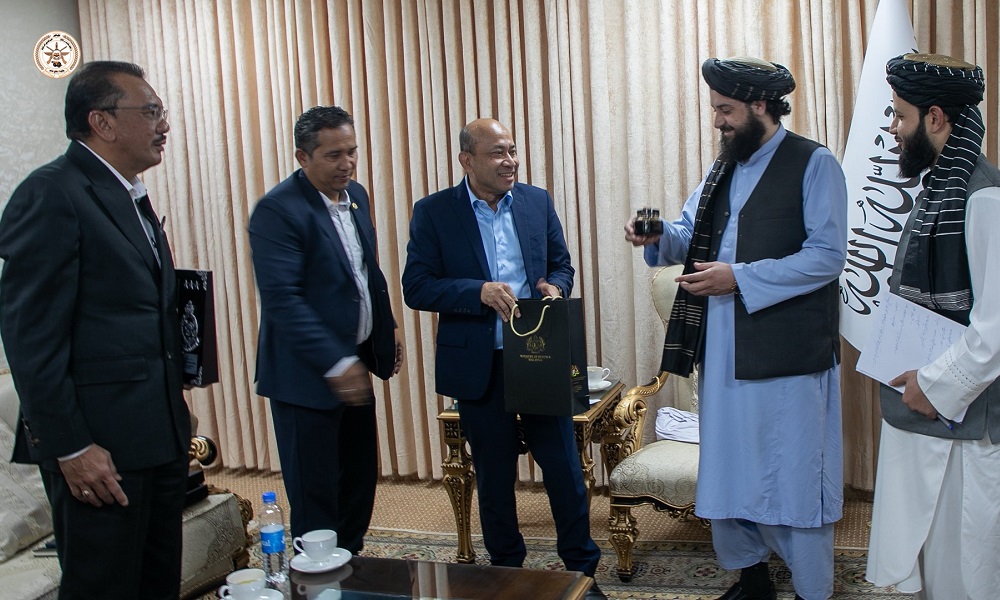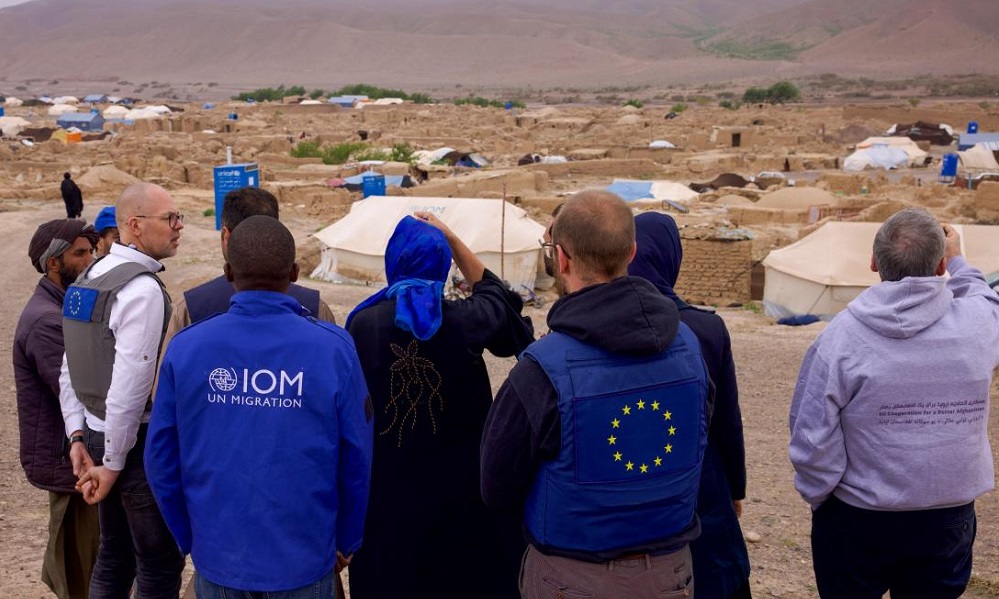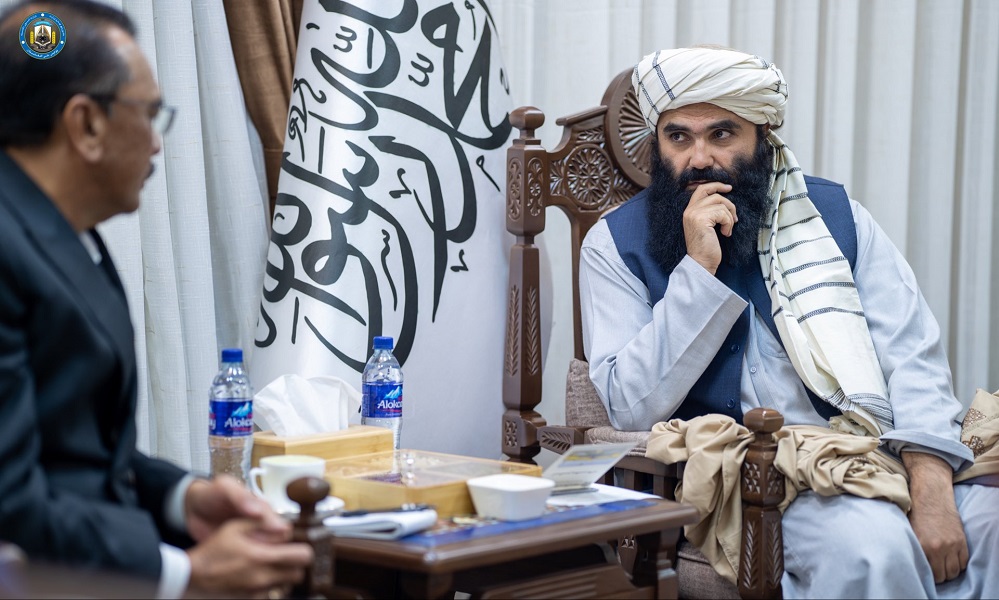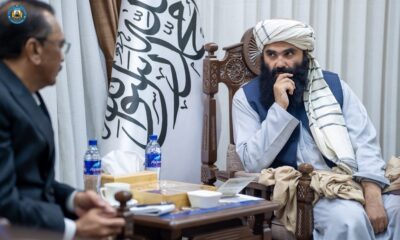Latest News
Analysing the unthinkable; a year after the maternity ward attack

One year ago today – on May 12 – the maternity ward of the Dasht-e-Barchi hospital in Kabul was attacked. An attack that shocked the world.
Twenty-four people were killed according to official sources, many of them new mothers.
The maternity ward was run at the time by Médecins Sans Frontières (MSF), who went on to conduct their own fact-finding mission into the devastating incident.
In a statement issued by Médecins Sans Frontières, Dr Isabelle Defourny, MSF director of operations, explains what they found and some of the lessons learned.
“I recall the first days, our progressive understanding of how this massacre had been perpetrated: attackers had deliberately, and methodically, killed mothers and pregnant women, in their beds, one after the other. Such a horrible attack on a maternity ward has no precedent, either in Afghanistan or in MSF’s 50-year history. Never would we have thought that violence could be unleashed on women at the moment when they are the most vulnerable: when giving birth. There is an unbearable symbolic meaning in this act of violence.
“Then followed days and weeks of intense activity, in which we tried our best to provide support – including mental healthcare – to the wounded, to the families of the victims and to our staff.
“Some weeks later, we had to make the difficult choice to withdraw from Dasht-e-Barchi. We knew we would leave behind huge needs. For many women in the neighbourhood, our maternity ward was a much-needed resource; 16,000 deliveries had taken place there in 2019 alone. But we couldn’t continue our activity after what happened,” Defourny said.
Why did MSF run a fact-finding exercise?
“On the one hand, it’s part of our standard practices following such severe security events, to describe as precisely as we can the chronology and description of the attack, but also to analyse the elements which allowed such an event to take place and what could have been done to avoid it. It allowed us to re-evaluate the environment and our positioning in a given context, how security risks were assessed and managed. This exercise didn’t aim to review our decision to leave Dasht-e-Barchi, but was intended to be useful for the other existing MSF activities in Afghanistan.
“On the other hand, we feel it’s important, and a sort of duty towards the victims, but also the survivors and our staff in Afghanistan and beyond, to try and understand what we can of what happened.
“This is why, even though we knew beforehand that we couldn’t obtain all the answers to our questions, it was important and necessary to perform this exercise,” she said.
What did the fact-finding exercise consist of?
“Interviews were done with MSF staff and other witnesses present on site or in areas surrounding the maternity ward, as well as with relevant external stakeholders involved at the national and international level. In total, 38 witnesses and 45 external stakeholders and experts were interviewed by MSF.
“We also reviewed material and factual elements, as well as publicly available elements such as statements in the media and on social media.”
What did this fact-finding exercise allow you to establish?
“First, it allowed us to gather and check some elements, which proved complicated during the first weeks following the attack, and to confirm some information: a total of 24 people were killed according to official sources, including one of our midwives, Maryam, 16 mothers, and two children aged 7 and 8.
“Six MSF staff, one newborn and one caretaker were also wounded in the attack. This inquiry also confirmed that existing security protocols limited the number of casualties among MSF staff and patients. For instance, more than 90 people were able to take refuge in the maternity ward’s safe rooms.
“However, for some of the key questions – notably the identity of the perpetrators of this massacre, and their motivations – no solid conclusion or certainty came out of this exercise.
“Our fact-finding process didn’t allow us to determine with certainty the identity of the perpetrators of the attack and their motives,” she said.
Do you know more about the perpetrators and their motivations?
“No one has claimed responsibility for this attack. Immediately after it, Afghan authorities publicly blamed the Taliban – or Islamic Emirate of Afghanistan – who refuted and condemned the accusation, while in the media representatives of foreign governments accused Islamic State Khorasan Province (IS-KP/Daesh). However, no evidence was made public to support those claims. Since then, we have only received oral information that an Afghan investigation on the attack is ongoing.
“Our fact-finding process didn’t allow us to determine with certainty the identity of the perpetrators of the attack and their motives.
“However, the most likely hypothesis is that the attack was committed by at least two members of the IS-KP armed group. Some sources mentioned the support from other armed groups which our inquiry couldn’t confirm or deny.
“Even if we don’t know who was responsible, the exercise suggested that reasons for this attack might relate to a form of retaliation regarding Afghan authorities. In this hypothesis, pregnant women would have been targeted because one week before this attack, three women, including two pregnant women, had been killed during a military operation run by Afghan military forces against IS-KP; or because of the situation of women and children allegedly supporting IS-KP and being held under arrest by Afghan authorities.
“However, this doesn’t exclude the possibility that women and pregnant women were targeted as members of the Hazara community – this attack is one of a long series of attacks in recent years against this minority, particularly in the Dasht-e-Barchi neighbourhood,” Defourny said.
Was MSF targeted?
“Our fact-finding exercise gave no indication that MSF, as an institution, was directly targeted. However, we can’t exclude that the presence of MSF in this maternity ward may have played a role in the choice of this target.
“In any case, the first targets of this attack were pregnant women and women in labour in a maternity ward which we ran. We know that the attackers directly headed to the maternity ward and killed the pregnant women and women in labour who were present there. Two children who had come for routine vaccination and another caretaker were also shot dead in the attack. Healthcare staff were also killed and injured,” she said.
If MSF was not directly targeted, why wouldn’t you resume activities in Dasht-e-Barchi?
“We can’t work in an environment where patients and medical staff are targeted, and where we can’t prevent such a massacre from happening again.
“This attack clearly targeted pregnant women in a maternity ward run by MSF. And the fact-finding exercise confirmed that none of the different parties with whom we have relations in Afghanistan gave us specific alerts on it.
“Our will to continue working in Afghanistan is motivated by the dire medical needs of the Afghan people… but can only continue if minimum conditions of safety are ensured…,” she said.
What does this mean for MSF’s presence in Afghanistan?
“Our will to continue working in Afghanistan is motivated by the dire medical needs of the Afghan people. This is particularly true in the context of the COVID-19 pandemic, and at a time when the 20-year-long international military presence comes to an end and internal political dynamics are shifting. But our work can only continue if minimum conditions of safety are ensured for our patients and staff.
“When MSF returned to Afghanistan 12 years ago – after we had withdrawn in 2004 following the killing of five of our colleagues – we knew it was one of the most dangerous countries to work in. At that time, our analysis was that it was possible to craft a safe working space for us, by renewing our engagement with all the different parties involved.
“Since then, after the attack on our hospital in Kunduz, and the one on the Dasht-e-Barchi maternity ward, we have to admit that this wasn’t enough. In these two attacks, 66 people were killed – by far the highest number of deaths in our programmes around the world over the last six years. Our organisation can’t accept the idea of integrating the loss of our staff or of the patients we treat as part of our work. We maintain our freedom to withdraw and stop our activities when we think that the risk of such severe attacks repeating themselves is too great.
“Although security and political dynamics are different from one area to another, globally our presence in the country today remains constrained and limited. We continue our work by intervening only in areas where we feel that we can build a solid base, by constantly reviewing the context and security incidents, by reducing the exposure of our staff, particularly in Kabul, and by reinforcing our engagement with all local parties who will speak with us,” she concluded.
Latest News
No destructive groups including Daesh present in Afghanistan: Yaqub Mujahid

Acting Minister of National Defense Mohammad Yaqub Mujahid has said that no destructive groups including Daesh have physical presence in Afghanistan, adding the Islamic Emirate of Afghanistan (IEA) will not allow anyone to pose threat to any country in the region from the Afghan soil.
Mujahid made the remarks in a meeting with a delegation from Malaysia in Kabul on Thursday.
According to a statement released by the Ministry of Defense, Mujahid highlighted Malaysia’s “good treatment” of Afghan refugees and its long-standing relations with Afghanistan, and said that Malaysia is a powerful Islamic country and visits should increase.
He added that with the establishment of the Islamic Emirate, occupation and war ended in Afghanistan, and the country is fully secure.
Based on the statement, the Malaysian delegation called Afghanistan a friendly country and while emphasizing on comprehensive cooperation, it assured that what they have seen in Afghanistan will be shared with the authorities of their country.
Latest News
EU allocates 17 million euros to support Afghans on the move

The European Union signed an agreement worth 17 million euros with the International Organization for Migration (IOM) to improve access to basic services, increased economic opportunities and protection for Afghans on the move and their host communities in Afghanistan.
The needs of women and girls are a particular focus of the programme, EU said in a statement released on Thursday.
The statement noted that from January 2023 until April 2024, over 1.5 million Afghans returned from Pakistan and Iran.
“I am deeply moved by the hardship returnees face when being deported to Afghanistan. In a country suffering from poverty and climate change, and in a city that just saw devastating earthquakes, this truly is a crisis within a crisis.”, said Peteris Ustubs, Director for the Middle East, Asia and Pacific of the European Commission’s Department for International Partnerships during the signing ceremony at the IOM transit centre in Herat.
Raffaella Iodice, EU Chargée d’Affaires a.i. to Afghanistan, added “The solidarity of the Afghan people towards their brothers and sisters is an inspiration. We must assure that communities hosting and helping new arrivals are supported. The partnership with IOM ensures access to essential services and provides protection for Afghan returnees and their host communities. As women and girls can be particularly affected, we make sure that all members of society can benefit”.
“IOM’s continued partnership with the EU has been critical in enabling our teams to reach hundreds of thousands of Afghan returnees and other vulnerable communities in the country”, said IOM Afghanistan Chief of Mission, Maria Moita. “Thanks to this renewed commitment, we will be able to focus on addressing the immense challenges in the areas of return and contribute to reintegration, social cohesion, and longer-term solutions for those communities.”
This additional contribution is part of a 5-year programme that is being implemented across Afghanistan and in four countries in the region. It builds on the EU’s previous support to IOM to improve the wellbeing of Afghans forced to return to the country, EU said.
Latest News
Malaysia vows to share its experiences on cyber security with IEA

Acting Minister of Interior Affairs Sirajuddin Haqqani has said in a meeting with a delegation from Malaysia in Kabul that Malaysia is an advanced country and that Afghanistan should use is experiences.
According to a statement released by the Interior Ministry, Haqqani, in the meeting on Thursday, emphasized that security is ensured in Afghanistan and unity among Afghans has been restored.
He stated that the Islamic Emirate wants to have close relations and engagement with the world, especially Islamic countries.
The Malaysian delegation consists of representatives of the Ministries of Interior and Defense, and advisers of the Prime Minister’s Office.
According to the statement, a member of the delegation provided information about Malaysia’s capabilities in cyber security and tackling cyber crime, and said that Malaysia will share its experiences in this field with the Islamic Emirate.
In the meeting, the two sides also discussed the fight against drugs, police training, bilateral cooperation and exchange of experiences between Malaysia and Afghanistan.
-

 Latest News3 days ago
Latest News3 days agoRashid Khan named AWCC’s brand ambassador
-

 Regional4 days ago
Regional4 days agoIranian president lands in Pakistan for three-day visit to mend ties
-

 Climate Change5 days ago
Climate Change5 days agoMassive river flooding expected in China, threatening millions
-

 Sport4 days ago
Sport4 days agoKolkata beat Bengaluru by one run in IPL as Kohli fumes at dismissal
-

 Sport4 days ago
Sport4 days agoACL: Aino Mina 3-0 Istiqlal Kabul; Attack Energy 3-0 Khadim
-

 Climate Change4 days ago
Climate Change4 days agoRescuers race to reach those trapped by floods in China’s Guangdong
-

 Business5 days ago
Business5 days agoAfghanistan, Kazakhstan to hold joint expo in Kabul
-

 World3 days ago
World3 days agoMalaysian navy helicopters collide in mid-air, 10 killed
























